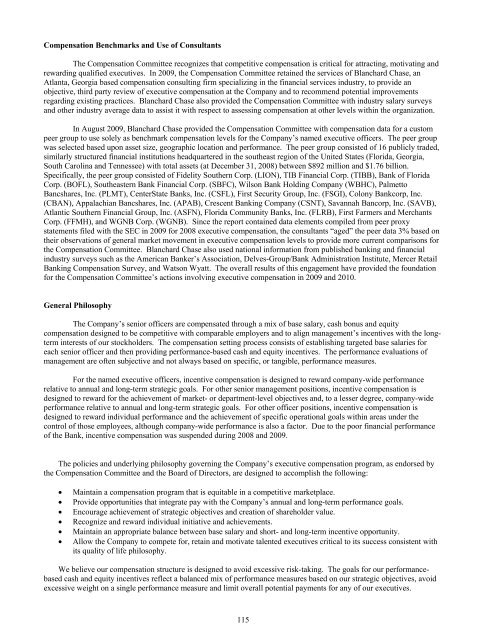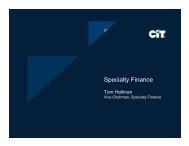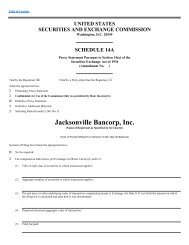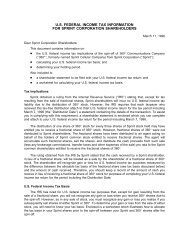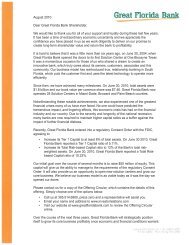pab bankshares, inc. - SNL Financial
pab bankshares, inc. - SNL Financial
pab bankshares, inc. - SNL Financial
Create successful ePaper yourself
Turn your PDF publications into a flip-book with our unique Google optimized e-Paper software.
Compensation Benchmarks and Use of Consultants<br />
The Compensation Committee recognizes that competitive compensation is critical for attracting, motivating and<br />
rewarding qualified executives. In 2009, the Compensation Committee retained the services of Blanchard Chase, an<br />
Atlanta, Georgia based compensation consulting firm specializing in the financial services industry, to provide an<br />
objective, third party review of executive compensation at the Company and to recommend potential improvements<br />
regarding existing practices. Blanchard Chase also provided the Compensation Committee with industry salary surveys<br />
and other industry average data to assist it with respect to assessing compensation at other levels within the organization.<br />
In August 2009, Blanchard Chase provided the Compensation Committee with compensation data for a custom<br />
peer group to use solely as benchmark compensation levels for the Company’s named executive officers. The peer group<br />
was selected based upon asset size, geographic location and performance. The peer group consisted of 16 publicly traded,<br />
similarly structured financial institutions headquartered in the southeast region of the United States (Florida, Georgia,<br />
South Carolina and Tennessee) with total assets (at December 31, 2008) between $892 million and $1.76 billion.<br />
Specifically, the peer group consisted of Fidelity Southern Corp. (LION), TIB <strong>Financial</strong> Corp. (TIBB), Bank of Florida<br />
Corp. (BOFL), Southeastern Bank <strong>Financial</strong> Corp. (SBFC), Wilson Bank Holding Company (WBHC), Palmetto<br />
Bancshares, Inc. (PLMT), CenterState Banks, Inc. (CSFL), First Security Group, Inc. (FSGI), Colony Bankcorp, Inc.<br />
(CBAN), Appalachian Bancshares, Inc. (APAB), Crescent Banking Company (CSNT), Savannah Bancorp, Inc. (SAVB),<br />
Atlantic Southern <strong>Financial</strong> Group, Inc. (ASFN), Florida Community Banks, Inc. (FLRB), First Farmers and Merchants<br />
Corp. (FFMH), and WGNB Corp. (WGNB). S<strong>inc</strong>e the report contained data elements compiled from peer proxy<br />
statements filed with the SEC in 2009 for 2008 executive compensation, the consultants “aged” the peer data 3% based on<br />
their observations of general market movement in executive compensation levels to provide more current comparisons for<br />
the Compensation Committee. Blanchard Chase also used national information from published banking and financial<br />
industry surveys such as the American Banker’s Association, Delves-Group/Bank Administration Institute, Mercer Retail<br />
Banking Compensation Survey, and Watson Wyatt. The overall results of this engagement have provided the foundation<br />
for the Compensation Committee’s actions involving executive compensation in 2009 and 2010.<br />
General Philosophy<br />
The Company’s senior officers are compensated through a mix of base salary, cash bonus and equity<br />
compensation designed to be competitive with comparable employers and to align management’s <strong>inc</strong>entives with the longterm<br />
interests of our stockholders. The compensation setting process consists of establishing targeted base salaries for<br />
each senior officer and then providing performance-based cash and equity <strong>inc</strong>entives. The performance evaluations of<br />
management are often subjective and not always based on specific, or tangible, performance measures.<br />
For the named executive officers, <strong>inc</strong>entive compensation is designed to reward company-wide performance<br />
relative to annual and long-term strategic goals. For other senior management positions, <strong>inc</strong>entive compensation is<br />
designed to reward for the achievement of market- or department-level objectives and, to a lesser degree, company-wide<br />
performance relative to annual and long-term strategic goals. For other officer positions, <strong>inc</strong>entive compensation is<br />
designed to reward individual performance and the achievement of specific operational goals within areas under the<br />
control of those employees, although company-wide performance is also a factor. Due to the poor financial performance<br />
of the Bank, <strong>inc</strong>entive compensation was suspended during 2008 and 2009.<br />
The policies and underlying philosophy governing the Company’s executive compensation program, as endorsed by<br />
the Compensation Committee and the Board of Directors, are designed to accomplish the following:<br />
• Maintain a compensation program that is equitable in a competitive marketplace.<br />
• Provide opportunities that integrate pay with the Company’s annual and long-term performance goals.<br />
• Encourage achievement of strategic objectives and creation of shareholder value.<br />
• Recognize and reward individual initiative and achievements.<br />
• Maintain an appropriate balance between base salary and short- and long-term <strong>inc</strong>entive opportunity.<br />
• Allow the Company to compete for, retain and motivate talented executives critical to its success consistent with<br />
its quality of life philosophy.<br />
We believe our compensation structure is designed to avoid excessive risk-taking. The goals for our performancebased<br />
cash and equity <strong>inc</strong>entives reflect a balanced mix of performance measures based on our strategic objectives, avoid<br />
excessive weight on a single performance measure and limit overall potential payments for any of our executives.<br />
115


